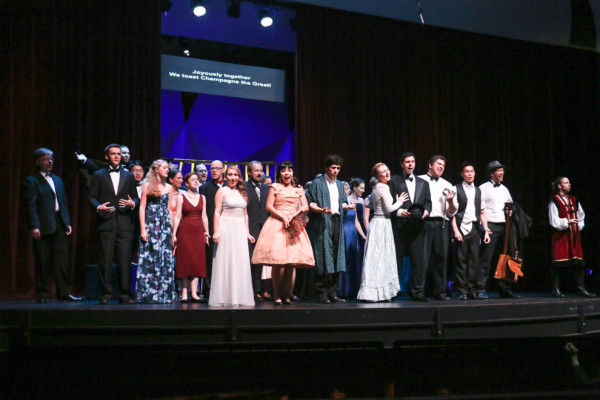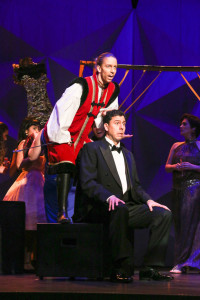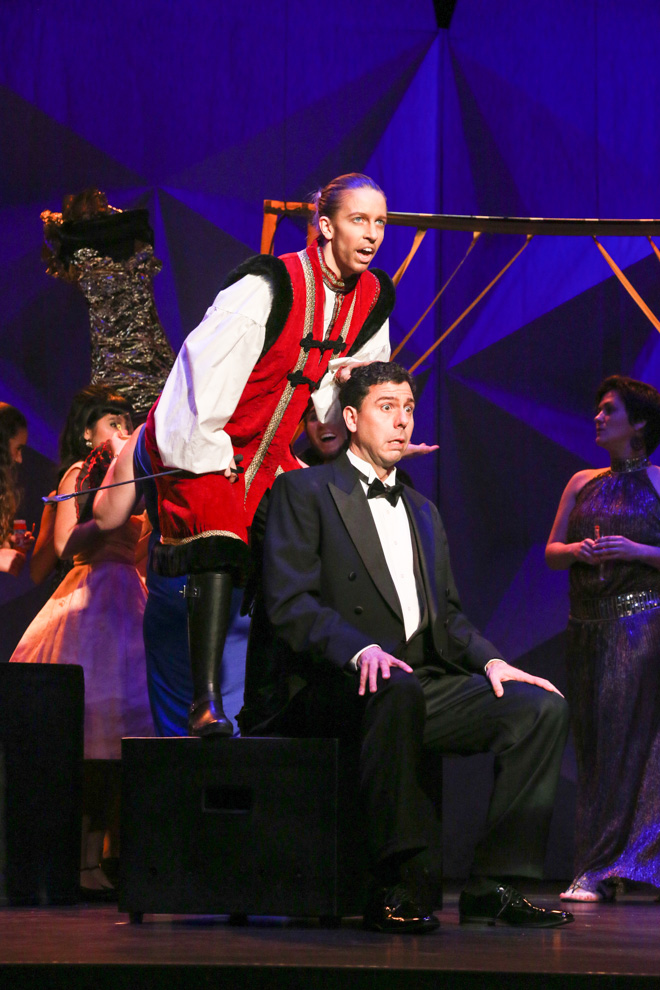
Exaggerated to the point of hilarity, “Die Fledermaus in Miniature” takes a multilinguistic spin on the comedic operetta. Sponsored by Stanford Live and the Stanford Music Department, “Fledermaus” took the stage of Dinkelspiel this past weekend to provide mirth over an action-packed 70 minutes. Under the unapologetic direction of Marie-Louise Catsalis, the cast, crew and orchestra of “Die Fledermaus” presented its audience with a comically overblown rendition of the Straussian classic.
Lousie-Catsalis merits commendation for conducting a faultless orchestra. Situated in a pit in front of and below the stage, the orchestra starts the show with a bang. The opening overture — characterized by the sharp, quick bow strokes and squealing high notes of the first violins — is energized and pleasant to listen to.
The action begins with Eisenstein (Christopher Jackson) storming into his apartment, furious at his trepidatious lawyer — played by the hysterical Jonathan Tilley ‘12. Eisenstein has been sentenced to jail, but through a case of mistaken identity, it is Alfred (Preston Lim ‘17), the singing teacher, who is taken away instead.
Eisenstein then attends a party where his wife, Rosalinde (Mia Farinelli ‘17), tests his fidelity by disguising herself as a Hungarian and seducing him. Meanwhile, their chambermaid, Adele (Leena Yin ‘17) escapes detection by pretending to be an actress. The confusion ends in true operetta fashion (i.e., cliché) when all is revealed to be a plot by Eisenstein’s friend, Falke — sung admirably by the young Dashiell Provost ‘18. Albert is released and Rosalind is reunited with her husband, the lot of them blaming the hullabaloo on the influence of “King Champagne.”

An opera is nothing if not a means of displaying vocal prowess, and the cast does just that. Christopher Jackson, a professional member of the San Francisco Opera, blows the audience away with his tremendous resonance. His mature, dark sound sticks out noticeably in a trio with Leena Yin and Mia Farinelli, his younger cast-mates.
That is not to say that these female powerhouses are substandard. Mia Farinelli demonstrates an impressive command of her upper register, especially in her high-reaching aria, “Homeland,” through which her character proves that she is Hungarian. Leena Yin is a master of vocal runs, flaunting this skill via “The Laughing Song,” in which she pretends to be an actress in order to deceive Eisenstein.
Matching the almost ostentatious display of vocal virtuosity, the cast engages in equally hyperbolized acting. Preston Lim is an exemplar of this: His hugely physicalized, hands-on-hips portrayal of Alfred is the source of much laughter, and his stereotypical Italian accent works well to round out the exaggerated performance. Another standout performance comes from John Ribeiro-Broomhead ‘17, who plays the irritable jailor. The glares of malcontent he casts toward Alfred — prompted by the teacher’s singing — provide a nice contrast to the jovial spirit of the show.
Augmenting the commendable acting is well-thought-out staging, organized by grad student Melissa Kagen. This comes to the foreground in the trio “How Sad We are,” sung by Adele, Rosalinde and Eisenstein as they eagerly await the upcoming party. Dancing circles around the stage, the characters fill the available space and even use different levels: Eisenstein and Rosalinde, sitting, cuddle on the bed — placed stage-left — while Adele, standing, dances with a mop stage-right.
The staging is even more laudable when you consider the minimalism of the set design. Consisting of a bed with a few pillows atop it and a golden drape — which serves as an entrance to Eisenstein’s apartment — the set subtly compliments the action in Act 1. In Act 2, the curtain is drawn back to reveal two hilariously gaudy cutouts of Champagne bottles on either side of the drape, which is now an entrance to the party. The champagne bottles are an outrageous reinforcement of the carousing on-stage. In the final act, the curtain returns to its former position and the drape transforms into prison bars, behind which Alfred is held captive. Above the drape is a banner, upon which subtitles are displayed to translate the myriad languages.
Flipping back-and-forth confusedly from English to German to Italian to Hungarian to French, music professor Marie-Louise Catsalis had no hesitations in making this operetta as multilingual as possible. While the vernacular is mostly done in English, the singing language is erratic. Her artistic decision manifests most blatantly in a duet between Eisenstein and Rosalinde, in which the former sings in German while the latter sings in English. The constant shifting of languages is confusing and adds little to the production.
After curtain call, I left Dinkelspiel auditorium with tears in my eyes from laughing so hard. The various components of Marie-Louise Catsalis’ audacious production work well to produce an evening of great mirth. I tip my hat off to the company of “Die Fledermaus” and its king — Champagne.
Contact Ian Anstee at ianstee5 “at” stanford.edu.
